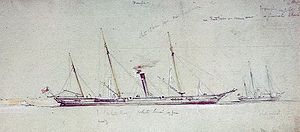Arrow-class gunvessel
 HMS Beagle and Wrangler by Sir Oswald Brierly, 1855
| |
| Class overview | |
|---|---|
| Name | Arrow class |
| Builders |
|
| Operators |
|
| Cost |
|
| Built | 1854 |
| In commission | 1854–1866, 1875-1902 |
| Completed | 7 |
| Lost | 0 |
| General characteristics [1] | |
| Displacement | 586 tons |
| Tons burthen | 476 68⁄94 bm |
| Length | 160 ft (48.8 m) |
| Beam | 25 ft (7.6 m) |
| Draught | 11 ft 8 in (3.6 m) (aft) |
| Depth of hold | 13 ft 3 in (4.0 m) |
| Installed power |
|
| Propulsion |
|
| Sail plan | Barque-rigged |
| Complement | 65 |
| Armament |
|
The Arrow class comprised six second-class screw-driven vessels built as dispatch vessels for the Royal Navy in 1854, mounting six guns. In 1856 they were re-designated as second-class gunvessels. A seventh vessel was built for the Argentine Navy in 1875.
Construction
[edit]Design
[edit]The Crimean War sparked a sudden need for shallow-draught, manoeuvrable vessels for inshore work in the Baltic and the Black Sea. The Arrow class of six wooden-hulled screw steamers were built during 1854 to a design by the Surveyor's Department. Construction was undertaken at two commercial yards on the Thames, R & H Green at Blackwall Yard and C J Mare & Company, at Leamouth. Two further designs of Crimean War gunvessel were ordered during 1855, the Intrepid class and the Vigilant class, and in 1856 the six Arrow-class dispatch vessels were re-classed as second-class gunvessels.
Propulsion
[edit]A two-cylinder horizontal single expansion steam engine provided 160 horsepower (119 kW) through a single screw.[1]
Sail plan
[edit]All Arrow-class gunvessels were barque-rigged.[1]
Armament
[edit]The Arrow class were provided with two 68-pounder Lancaster muzzle-loading rifles weighing 95 long cwt (4,800 kg) on pivot mounts, and four 32-pounder 25 long cwt (1,300 kg) guns.
Ships
[edit]| Name | Ship builder | Launched | Fate |
|---|---|---|---|
| Arrow | C J Mare & Company, Leamouth | 26 June 1854 | Hull sold to Marshall on 19 May 1862 |
| Beagle | C J Mare & Company, Leamouth | 20 July 1854 | Sold at Hong Kong on 16 July 1863, became the Japanese Kanko. Broken up 1889 |
| Lynx | C J Mare & Company, Leamouth | 22 July 1854 | Sold to Marshall on 19 May 1862 for breaking at Plymouth |
| Snake | C J Mare & Company, Leamouth | 6 September 1854 | Sold to Marshall, Plymouth in 1864 |
| Viper | R & H Green, Blackwall Yard | 23 July 1854 | Sold to Marshall on 19 May 1862 for breaking at Plymouth |
| Wrangler | R & H Green, Blackwall Yard | 19 June 1854 | Broken up by Castle at Charlton in May 1866 |
| Bermejo | Messrs. Rennie | 19 June 1875 | For Argentine Navy.[2] |
Operational lives
[edit]Wrangler was sent to the Baltic on completion, and the others of the class to the Black Sea where they took part in the Crimean War. The Lancaster guns were not entirely successful, and the class had their armament reduced, being employed in their original designation as dispatch vessels.
Citations
[edit]References
[edit]- Colledge, J. J.; Warlow, Ben (2006) [1969]. Ships of the Royal Navy: The Complete Record of all Fighting Ships of the Royal Navy (Rev. ed.). London: Chatham Publishing. ISBN 978-1-86176-281-8.
- Winfield, R.; Lyon, D. (2004). The Sail and Steam Navy List: All the Ships of the Royal Navy 1815–1889. London: Chatham Publishing. ISBN 978-1-86176-032-6. OCLC 52620555.
